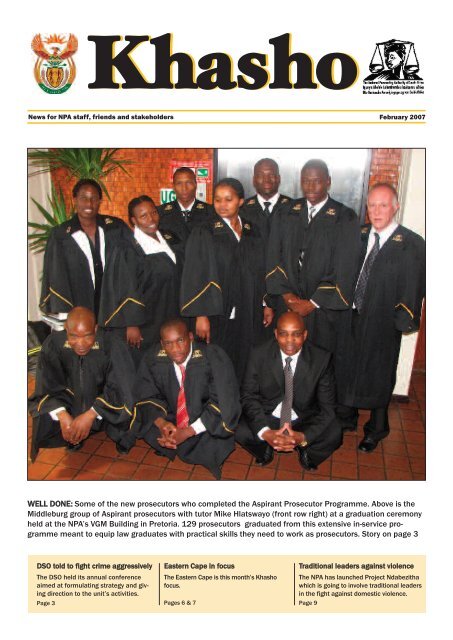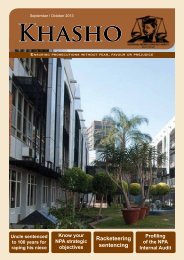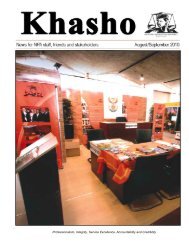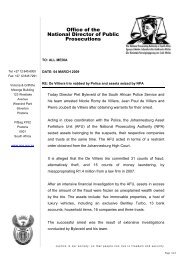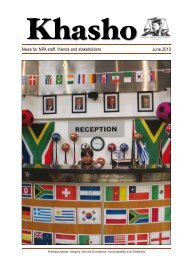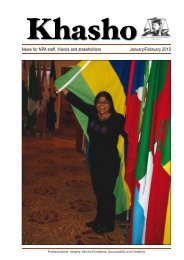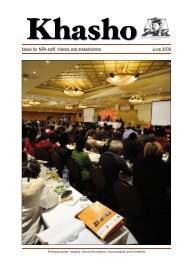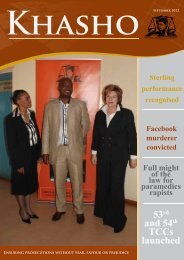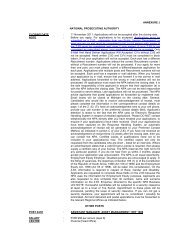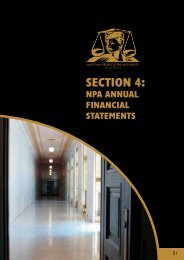Khasho February 2007 - National Prosecuting Authority
Khasho February 2007 - National Prosecuting Authority
Khasho February 2007 - National Prosecuting Authority
Create successful ePaper yourself
Turn your PDF publications into a flip-book with our unique Google optimized e-Paper software.
<strong>Khasho</strong><br />
News for NPA staff, friends and stakeholders<br />
<strong>February</strong> <strong>2007</strong><br />
WELL DONE: Some of the new prosecutors who completed the Aspirant Prosecutor Programme. Above is the<br />
Middleburg group of Aspirant prosecutors with tutor Mike Hlatswayo (front row right) at a graduation ceremony<br />
held at the NPA’s VGM Building in Pretoria. 129 prosecutors graduated from this extensive in-service programme<br />
meant to equip law graduates with practical skills they need to work as prosecutors. Story on page 3<br />
DSO told to fight crime aggressively Eastern Cape in focus Traditional leaders against violence<br />
The DSO held its annual conference<br />
aimed at formulating strategy and giving<br />
direction to the unit’s activities.<br />
The Eastern Cape is this month’s <strong>Khasho</strong><br />
focus.<br />
Page 3 Pages 6 & 7 Page 9<br />
The NPA has launched Project Ndabezitha<br />
which is going to involve traditional leaders<br />
in the fight against domestic violence.
2 Letter from the <strong>National</strong> Director<br />
Now is the time<br />
After all the hysteria and pomp of the<br />
public launch of our Strategy 2020<br />
at the Stakeholder Conference last<br />
month has died down, the public will be<br />
expecting a service with a difference from<br />
the <strong>National</strong> <strong>Prosecuting</strong> <strong>Authority</strong>. So we<br />
must serve with a difference.<br />
A lot of expectations have been<br />
generated in the eyes of the public we serve.<br />
The expectations generated as a result of a<br />
document, must be consistent with the<br />
realities when it comes to practical<br />
implementation.<br />
Our Strategy must not be seen as<br />
another document but as a living one.<br />
We need to put the public first – and this<br />
is not meant for prosecutors only, but for all<br />
civil servants.<br />
All of us need to individually and<br />
collectively look at our roles in terms of<br />
making a difference to reducing crime and<br />
to serving our customers.<br />
For me the principles of Batho Pele<br />
should serve as a guiding light and not just a<br />
slogan.<br />
At times I wonder whether we<br />
understand these principles when we invoke<br />
them – to serve selflessly.<br />
Also, given the nature of our democracy<br />
we need to understand the role of a<br />
prosecutor in a democratic dispensation.<br />
And for this to happen we need to<br />
internalise the Bill of rights; to understand<br />
<strong>National</strong> Director of Public<br />
Prosecutions Advocate Vusi Pikoli<br />
“All of us need to individually<br />
and collectively look at our<br />
roles in terms of making<br />
difference to reducing crime<br />
and to serving our<br />
customers”<br />
what is expected of us in terms of Section<br />
198 of our Constitution – to create a better<br />
life.<br />
For us the question of the unacceptably<br />
high levels of crime is not an academic<br />
debate because we are right in the<br />
front trenches of this fight.<br />
We need to have courage and passion for<br />
our work.<br />
I have said this before and I will repeat it<br />
here.<br />
It saddens me when I see prosecutors<br />
being brought before court for having<br />
committed acts of crime.<br />
Something is wrong somewhere … we<br />
can’t have prosecutors being prosecuted.<br />
We need to interrogate ourselves and<br />
examine our recruitment processes.<br />
We can’t be seen as people without<br />
integrity. Integrity is the only way in<br />
which our people will have confidence<br />
in the NPA and the criminal justice<br />
system as a whole.<br />
Contents<br />
3<br />
4<br />
5<br />
Aspirant prosecutors graduate<br />
Collective wisdom at Scorpions’ conference<br />
Showtime with the NPA / “We should not be scandalised”<br />
9<br />
Traditional leaders fight domestic violence<br />
10<br />
Managing risk at NPA / Enhance employee wellness<br />
11<br />
On track for new human capital<br />
6 & 7<br />
Regional Focus: Eastern Cape<br />
12<br />
fond farewell / “I am proud to be prosecutor”<br />
8<br />
Blind tutor grooms law grads
NPA News<br />
3<br />
GRADUATION: One aspirant prosecutor receives his certificate from NDPP Adv Vusi Pikoli.<br />
Aspirant prosecutors graduate<br />
“As you begin your careers in the courts of South Africa, you stand up second<br />
to nobody in court, so do your work with confidence”<br />
Atotal of 129 prosecutors have joined<br />
the ranks of the <strong>National</strong> <strong>Prosecuting</strong><br />
<strong>Authority</strong>.<br />
‘The NPA appreciates you and says you<br />
are worthy of being a part of this family,” said<br />
<strong>National</strong> Prosecutions Service head Advocate<br />
Mokotedi Mpshe, at the graduation<br />
ceremony.<br />
These are this year’s candidates of the<br />
Aspirant Prosecutor Programme. They were<br />
awarded their certificates at a ceremony held<br />
at the NPA’s VGM Building in Pretoria.<br />
The Aspirant Prosecutor programme is an<br />
extensive in-service training programme<br />
meant to equip law graduates with the<br />
practical skills they need to work as<br />
prosecutors.<br />
The initiative can also be seen in light of<br />
the <strong>National</strong> Skills Development Strategy<br />
whose priority it is to ensure the country has<br />
appropriately skilled professionals.<br />
It is also one of the many projects that will<br />
help the NPA to realise its goal of offering an<br />
effective and efficient service by 2020.<br />
Speaking at the ceremony, <strong>National</strong><br />
Director of Public Prosecution Advocate Vusi<br />
Pikoli reminded the new prosecutors that the<br />
bigger goal was ensuring the reduction of the<br />
high levels of crime in the country.<br />
“You must familiarise yourselves with all<br />
our policies and as you carry your daily<br />
duties, know that we are called to be truth<br />
seekers. Our aim is not to persecute but to<br />
ensure a fair application of justice.<br />
“As you begin your careers in the courts of<br />
South Africa, you stand up second to nobody<br />
in court, so do your work with confidence,”<br />
Pikoli said.<br />
Head of the programme Advocate<br />
Daphney Rangaka said the initiative was<br />
broadly about development and<br />
empowerment.<br />
The training programme was previously<br />
run by the Justice College under the auspices<br />
of the Department of Justice and<br />
Constitutional Development.<br />
The NPA took over the project in 2004<br />
and since then 615 new prosecutors have<br />
been trained.<br />
“What prompted the development of this<br />
initiative is the realisation that there needs to<br />
be a bridging mechanism between the theory<br />
the students are taught at university and the<br />
challenges of practical implementation once<br />
they begin to practise as prosecutors” said<br />
Rangaka.<br />
Currently the programme runs for six<br />
months, but Rangaka said they are looking<br />
into changing it to run as a Learnership. She<br />
said this means it would have to be extended<br />
to run for 12 months.<br />
The NPA also plans to extend the number<br />
of centres that offer the Aspirant Prosecutor<br />
training from 15 to 20 centres around the<br />
country.<br />
Rangaka said they are being faced with the<br />
challenge of resources for people with<br />
disabilities.<br />
“We are finding that more of the students<br />
who want to be in the programme are blind<br />
and therefore need specific equipment that<br />
caters for their needs.
4 NPA News<br />
Collective<br />
wisdom at<br />
Scorpions’<br />
conference<br />
NO FEAR, NO FAVOUR: Adv George Bizos said it was important for the judiciary<br />
and prosecuting authority to remain independent.<br />
The Directorate of Special Operations<br />
held its annual conference<br />
aimed at formulating a strategy and<br />
giving direction to the unit’s activities for<br />
the future.<br />
Held at Emperors Palace in Kempton<br />
Park from 18 to 21 April, the conference<br />
was attended by several high profile speakers<br />
who are in the criminal justice system<br />
and other fields who shared their wisdom<br />
with the Scorpions as they charted the way<br />
forward.<br />
Addressing the more than 300 delegates,<br />
South African Revenue Services<br />
Commissioner Pravin Gordhan warned<br />
that there is mounting evidence that crime<br />
is damaging the development this country<br />
was working towards. Therefore, there is a<br />
need for a capable State to fight crime aggressively.<br />
“The global economy has to grapple<br />
with a threat of highly sophisticated criminal<br />
syndicates and so we need the right expertise<br />
in order to fight these elements” he<br />
said.<br />
Gordhan also shared some of SARS’s<br />
winning formulas. He said that what has<br />
helped them ensure compliance with tax<br />
laws among South Africans was that they<br />
focused on four pillars namely:<br />
• Continuous education,<br />
• Ensuring a simple and efficient<br />
service<br />
• Enforcement of law on offenders<br />
• High levels of professionalism<br />
Judge Dunston Mlambo of the Legal<br />
Aid Board said that transformation of this<br />
country could not be achieved by a mere<br />
passing of laws, but the laws need to be applied<br />
fairly and justly without fear or<br />
favour.<br />
As a partner in the criminal justice system,<br />
he raised concerns about DSO operations,<br />
among them being that some cases<br />
fail because proper procedures are not followed<br />
and the continuous arrest of petty<br />
criminals which he said, didn’t make much<br />
of a difference in<br />
fighting crime.<br />
He insisted that<br />
there needs to be<br />
more concerted efforts<br />
to get to the<br />
masterminds.<br />
Eminent member<br />
of the legal profession,<br />
Advocate<br />
George Bizos quoted<br />
widely from the Constitution,<br />
the NPA Act and a number of<br />
legal papers in his speech, emphasising that<br />
it was important that the judiciary and<br />
prosecuting authority remain independent<br />
and exercise their duties without fear,<br />
favour or prejudice.<br />
He also warned that the unfair criticism<br />
of the <strong>National</strong> <strong>Prosecuting</strong> <strong>Authority</strong> and<br />
suggestions that its officials were part of<br />
conspiracies was harmful not only to the<br />
authority and responsible individuals but<br />
undermined the administration of justice<br />
in general.<br />
“The freedom of expression enshrined<br />
in section 16(1) of the Constitution is an<br />
important provision to protect those who<br />
speak the truth and make fair comment or<br />
on the facts which may not be true but<br />
’<br />
“The global economy has to grapple<br />
with a threat of highly sophisticated<br />
criminal syndicates and so we need<br />
the right expertise in order to fight<br />
these elements”<br />
which they reasonably believe to be true<br />
provided that reasonable steps were taken<br />
to verify their correctness. The <strong>National</strong><br />
<strong>Prosecuting</strong> <strong>Authority</strong> and its prominent<br />
members may in terms of the decisions of<br />
our courts find it more difficult than the<br />
ordinary citizens to defend themselves<br />
against those allegations” he added.<br />
He warned therefore that “whilst prosecutors<br />
can to some<br />
extent be criticised,<br />
they cannot be scandalised”.<br />
Economist Dr Iraj<br />
Abedian made several<br />
observations including<br />
the fact that while<br />
economic growth in<br />
this country is being<br />
appreciated, times of<br />
prosperity are associated<br />
with the decline in moral and ethical<br />
behaviour across the board.<br />
“Criminal and unethical transactions<br />
thus rise as economic boom persists, creating<br />
opportunities for quick riches” he said.<br />
In addition, he warned that political instability<br />
and economic crisis in our neighbouring<br />
countries posed a risk for South<br />
Africa.<br />
He said this could lead to opportunities<br />
for black market currency trading, increase<br />
in the number of illegal immigrants which<br />
in turn, may lead to illegal operations led<br />
by international syndicates.<br />
He concluded that more proactive<br />
measures were needed to mitigate crime<br />
and the fight against needed to be more<br />
visible.
NPA News<br />
5<br />
Showtime with the NPA<br />
INTERESTED Members of the public were keen to hear the message of the NPA<br />
The <strong>National</strong> <strong>Prosecuting</strong> <strong>Authority</strong><br />
(NPA) had its first exhibition at<br />
this year’s Rand Show in Nasrec,<br />
Johannesburg.<br />
The Rand Show, considered the biggest<br />
annual showground, this year celebrated<br />
its 109th year.<br />
The 15-day event which attracts thousands<br />
is used by many to showcase their<br />
wares, shopping and for family entertainment.<br />
NPA Public Relations Manger Mona<br />
Moerane said they used the event to get<br />
peoples’ views and perception and also to<br />
make the NPA familiar to the public.<br />
Around 8 000 people visited the stand.<br />
Moerane said she was satisfied and also<br />
surprised by the turnout as it was the<br />
NPA’s first exhibition at the Show. She<br />
said most people did not know much<br />
about the NPA but were relatively informed<br />
about the Directorate of Special<br />
Operations (DSO) with regards to the<br />
Scorpions. Questions asked by the public<br />
ranged from NPA’s views of the Jacob<br />
Zuma trial to future plans of the NPA in<br />
resolving the crime situation in the country.<br />
The Director of Public Prosecutions,<br />
Advocate Vusi Pikoli made an appearance<br />
at the stand. He was mainly asked questions<br />
regarding high profile cases. “People<br />
recognised Pikoli as the head of Scorpions<br />
and not of NPA. Most people were<br />
very interested in the NPA and said the<br />
newsletter should be distributed more<br />
widely,” said Moerane.<br />
An internal brand review is currently<br />
underway at NPA which will be completed<br />
at the end of May, said Senior Public<br />
Relations Manager Nomfundo<br />
Luphondwana. This will provide people<br />
with a broader knowledge and understanding<br />
of the NPA.<br />
“We should not be scandalised”<br />
The NPA had its annual report and budget<br />
presentation to the <strong>National</strong> Assembly justice<br />
committee on May 2. <strong>National</strong> Director<br />
of Public Prosecutions Adv Vusi Pikoli<br />
spoke strongly to senior people in political<br />
organisations, with the emphasis on the<br />
ruling party, to consider the consequences<br />
of attacks directed at state law enforcement<br />
agencies.<br />
This was after alledged criticism to the<br />
NPA over the years from various politicians,<br />
including ANC deputy president<br />
Jacob Zuma, former transport minister<br />
Mac Maharaj and former Mpumalanga<br />
premier Matthews Phosa. Recent attacks to<br />
the NPA were from Phosa who likened the<br />
Scorpions to the “old apartheid police<br />
agency” during a Workers’ Day rally in<br />
Soweto. Pikoli stressed that they wanted to<br />
hear more of voices that stand up when issues<br />
like this happen as the NPA also gets<br />
attacked for implementing and applying<br />
laws that are passed by “this democratic<br />
parliament”, said Pikoli.<br />
He went on to say such attacks on the NPA<br />
were a threat to democracy and undermined<br />
the integrity of state institutions and<br />
also placed the lives of NPA members at<br />
risk. “I‘ve got thousands of prosecutors out<br />
there who are good public servants, doing<br />
their jobs guided by the laws and the constitution<br />
of this country. It’s going to be a<br />
bad day when you have prosecutors feeling<br />
intimidated, because once that happens<br />
there’s no guarantee that there’ll be a<br />
proper dispensation of justice. Most prosecutors<br />
stay in different communities and<br />
once you start making statements comparing<br />
state institutions to the former<br />
apartheid institutions, then you are calling<br />
on the people to defy the law. I am saying<br />
that these matters should be addressed<br />
properly and we should not be scandalised.”<br />
The NPA has also been accused of leaking<br />
information to the media. Pikoli does not<br />
dismiss this as he says it is possible that<br />
some of the leaks to the media came from<br />
Scorpions members. “Measures have been<br />
introduced to curb such occurrences,” he<br />
said. He urged legislators who were responsible<br />
for the laws under which the<br />
prosecution authority operated, to defend<br />
it from these attacks.
6<br />
Eastern Cape strives for efficiency<br />
<strong>Khasho</strong> interviewed<br />
Director of Public<br />
Prosecutions in the<br />
Eastern Cape Adv Lungi<br />
Mahlati S.C on his<br />
office’s<br />
attempts to serve the<br />
province better.<br />
IN CHARGE:<br />
Director of<br />
Public Prosecutions<br />
Adv Lungi<br />
Mahlati S.C<br />
(left) with<br />
corporate<br />
manager<br />
Anthony<br />
Bean.<br />
Provinci<br />
QWhat are your priorities as director in<br />
this region<br />
To improve service delivery,<br />
accountability and closer community cooperation.<br />
To ensure the best possible service<br />
to the public, our deputy directors are<br />
required to go to court regularly to appear in<br />
the more complicated cases.<br />
QHow do you monitor and implement<br />
strategic objectives<br />
A strategic plan is not worth the paper it is<br />
written on when its execution is not regularly<br />
monitored. If you can’t measure something,<br />
it can’t be managed.<br />
All the 39 districts as well as the Regional<br />
Court seats report back on a monthly basis<br />
on how they have managed, or not managed,<br />
to reach strategic objectives set in the<br />
Division’s strategic plan.<br />
The statistics are captured in an Excel<br />
document, and this allows management to<br />
form a clear picture of each office, compared<br />
with previous months, and also compared to<br />
the performance of other offices.<br />
Any corrective measures that need to be<br />
implemented can be identified at an early<br />
stage. Monthly cluster meetings take place,<br />
allowing the DPP to meet the prosecutors<br />
and magistrates, and also to learn first hand<br />
what the working conditions are like.<br />
Since information has been captured from<br />
2004, it was possible to compare every office’s<br />
and Regional Court’s performance during<br />
2005 with those during 2006, and similarly<br />
those of the clusters and ultimately those of<br />
the Divisions as a whole. At the strategic<br />
planning meeting for <strong>2007</strong>/8 on 15 and 16<br />
<strong>February</strong> <strong>2007</strong>, these figures played an<br />
important role to plan for the year ahead.<br />
QTell me about the Provincial<br />
Oversight Committee on Sexual<br />
Offences.<br />
It was decided some years ago to take the<br />
initiative from the DPP’s office and<br />
coordinate a multi-departmental approach to<br />
ensure as little as possible secondary<br />
victimisation of sexual assault survivors,<br />
better investigations and better prosecutions.<br />
One of my deputies now chair a quarterly<br />
meeting at our office, at which several<br />
departments including amongst others,<br />
Safety and Security, Social Development,<br />
Education, Health, the Premier’s Office and<br />
NGOs are represented. Goals and service<br />
delivery challenges are raised and addressed.<br />
At the same time this meeting also serves<br />
as the provincial oversight committee for the<br />
Thuthuzela Care Centre at Cecilia Makiwane<br />
Hospital in Mdantsane.<br />
As a result of these meetings, mini onestop<br />
trauma centres for sexually abused<br />
persons have spontaneously developed in<br />
several towns and cities. They are mostly part<br />
of hospitals in those towns like Port<br />
Elizabeth, Uitenhage, Grahamstown,<br />
Cradock, Graaff-Reinet, Aliwal North,<br />
Queenstown etc.<br />
QHow have police liaison officers<br />
contributed to the turnaround time of<br />
serious cases<br />
The old system of handling police dockets<br />
for serious cases whereby dockets would be<br />
relayed via prosecutors to the office of the<br />
DPP and to the police and back was time<br />
consuming. Since May 2005, our office<br />
appointed police liaison officers.<br />
These are experienced detectives who act<br />
as de facto branch commanders for all<br />
investigating officers whose dockets are<br />
referred to the DPP offices for decision. The<br />
strategy entailed the following; prosecutors<br />
were requested to submit any police docket<br />
identified for DPP decision within 30 days<br />
after the first appearance of the accused in<br />
court.<br />
The further investigation would then be<br />
directed directly from the DPP’s office, and<br />
communication with the investigating<br />
officers would take place not through the<br />
prosecutor but directly through the liaisons<br />
officer at the DPP offices.<br />
For cases going to High Court, the average<br />
turnaround time from first appearance in the<br />
magistrates court to the signing of the<br />
indictment, improved from 191 to 85 days.<br />
The average time from first appearance in the<br />
Magistrates Court to finalisation in the high<br />
court improved from 437 to 274 days.<br />
The average time from first appearance to<br />
decision by the DPP improved from 223.8 to<br />
147.8 days. Where only 47 percent of all DPP<br />
decisions could have been taken within three<br />
months of an accused’s first appearance in the<br />
magistrates court, this has improve to the<br />
extent that 75 percent of all decisions in the<br />
DPP office are taken within three months of<br />
the accused’s arrest.<br />
QTell me about the reduction of<br />
awaiting trial prisoners.<br />
The DPP has initiated a protocol between<br />
the NPS and the department of Correctional<br />
Services to drastically reduce the awaiting<br />
trial prison population in the Divisions.<br />
This involves, among other things, the<br />
release of certain awaiting trial prisoners with<br />
bail less than R1000, under supervision. But it<br />
has the further benefit that the victims of the<br />
specific crimes are encouraged to help with<br />
the monitoring of the released prisoners’<br />
movements to ensure that they comply with<br />
the conditions of release.<br />
This empowers the former victims and<br />
almost reverses the roles of perpetrator and<br />
victim.
al Focus<br />
NPA vision<br />
spread to youth<br />
Every year, thousands of learners from as<br />
far as Willowmoore, Steytlerville, Cradock and<br />
Somerset East converge on the town hall in<br />
Graaff-Reinet to attend a Career Expo<br />
organised by the Regional Office of the<br />
Department of Education for matrics in the<br />
Camdeboo region.<br />
With exhibitors ranging from universities,<br />
multi-national and para-statal corporations,<br />
banks, mining houses and other institutions,<br />
the NPA stand receives its fair share of<br />
attention, said Adv Carl Fischer, Chief<br />
Prosecutor for the cluster.<br />
“We interact with over 3000 learners.<br />
Perhaps none of them will go on to become<br />
prosecutors but they will all have heard the<br />
message that we are the People’s lawyers and<br />
that we will never compromise on delivering<br />
justice to our communities,” Adv Fischer said.<br />
Local prosecutor Ntombesizwe Mtembu-Tala<br />
said, “We are unable to offer bursaries like<br />
other institutions yet we are always amazed<br />
at the enthusiasm and the positive image that<br />
the prosecutors enjoy in these rural areas”.<br />
Fast Facts:<br />
Working languages: Xhosa, Afrikaans, English<br />
Director of Public Prosecutions: Adv Lungi<br />
Mhlati S.C<br />
Deputy Directors of Public Prosecutions:<br />
Adv Malcolm Sotenjwa (Grahamstown)<br />
Adv Hannelie Bakker (Port Elizabeth)<br />
Adv Chris de Klerk S.<br />
Adv Malherbe Marais<br />
Adv Johan Bezuidenhout<br />
Adv Chris Nel<br />
Chief Prosecutors:<br />
Reon Lombard (PE cluster)<br />
Carl Fischer (Queenstown cluster)<br />
Andre Bezuidenhout (East London cluster)<br />
Corporate Manager (level 13):<br />
Anthony Bean<br />
Units:<br />
<strong>National</strong> Prosecutions Service<br />
Specialised Commercial Crimes Unit<br />
Asset Forfeiture Unit<br />
Witness Protection Unit<br />
Directorate of Special Operations<br />
NATURAL WONDER: The Baviaanskloof area in the Eastern Cape.<br />
Prosecutors protect the wilderness<br />
The Baviaanskloof Wilderness area lies<br />
between the parallel east-west running<br />
Baviaanskloof and Kouga mountain ranges.<br />
The eastern-most point of the valley is some<br />
95km north-west of Port Elizabeth.<br />
A beautiful bio-diverse area, it is often<br />
plagued by poachers and cycad thieves.<br />
Senior State Advocate Martin le Roux is<br />
chairperson of the Friends of Baviaanskloof, a<br />
volunteer conservation group. They are<br />
actively involved in raising awareness of<br />
conservation issues and act as honourary<br />
rangers, assisting the department of Nature<br />
Conservation.<br />
As part of efforts to increase awareness<br />
about the Kloof and educate the local people<br />
on the value of its biodiversity, learners from<br />
the Cambria Primary School, based in the<br />
area, were taken on a wilderness experience.<br />
The children were taught basic life skills and<br />
spent time learning how to swim, fish and<br />
Who’s who in the Eastern Cape<br />
Deputy directors of Public Prosecutions: (from left)<br />
Adv Chris Nel, Adv Johan Bezuidenhout, Adv Hannelie<br />
Bakker, Adv Chris de Klerk S.C and Adv Malcolm Sotenjwa.<br />
7<br />
identify birds and trees.<br />
“A lot of these kids haven’t even been to<br />
the mountains in this area even though they<br />
live so close,” said Adv Le Roux.<br />
The Fynbos Forum, an affiliation of multidisciplined<br />
conservationists, presented an<br />
award to the Friends of Baviaanskloof in<br />
recognition of the good work they’ve done in<br />
the Kloof.<br />
As the senior state advocate in charge of<br />
organised crime prosecutions in the office of<br />
the DPP, Adv Le Roux often handles cases<br />
dealing with the smuggling of perlemoen and<br />
cycads.<br />
The Eastern Cape is a target particularly<br />
for the smuggling of cycads, yellowwood<br />
and disease-free buffalo. A Green Court has<br />
been established to channel all<br />
environmental crime prosecutions through<br />
the lower courts in PE and the DPP in<br />
Grahamstown.<br />
Chief prosecutors:<br />
(from left)<br />
Carl Fischer and<br />
Reon Lombard<br />
1 2 3<br />
1.The admin<br />
and legal staff<br />
at the PE office.<br />
2. The admin<br />
staff from the<br />
Bisho office.<br />
3. The admin<br />
staff at the Grahamstown<br />
office.
8 NPA People<br />
Blind tutor grooms law grads<br />
QWhat is the extent of your<br />
blindness<br />
My left eye is an artificial eye and it has<br />
no sight. My right eye has less than 10%<br />
sight with glasses, but furthermore the field<br />
of the sight is very limited to about 30%.<br />
That means that the normal area that you<br />
can observe with one eye, I can observe<br />
about 30% of that area. I am classified as<br />
blind and also attended the School for the<br />
Blind in Worcester.<br />
QWhat is your work background and<br />
qualifications<br />
I obtained a legal degree at the<br />
University of Free State in 1978 and started<br />
working as a prosecutor in the magistrate’s<br />
office in Vryburg in 1979.<br />
I was transferred to Kuruman in 1980<br />
but moved back to Vryburg in November<br />
1985 and served as Control Prosecutor,<br />
Regional Court Prosecutor and even<br />
Acting Additional Magistrate. In 1993 I<br />
was promoted to the position of Senior<br />
Prosecutor and transferred to Kimberley. I<br />
held this position for 10 years. As my<br />
eyesight further deteriorated, the Chief<br />
Prosecutor then offered me a “Performance<br />
Manager” post in the Kimberley cluster to<br />
implement the new Performance<br />
Management System. I became a<br />
tutor in 2004. Since then I have<br />
trained three groups in total, I’ve<br />
groomed 25 Aspirant Prosecutors<br />
and they were all found competent<br />
for permanent appointment.<br />
QHow do you teach with your<br />
disability<br />
Surely my disability does<br />
affect my work as tutor. The<br />
problem is that I cannot read<br />
the police dockets anymore, I<br />
have difficulty in reading<br />
anything, for example<br />
charge sheets,<br />
preparation sheets,<br />
e-mails, etc. Part<br />
of the learning is<br />
Petrus Du Plooy is a tutor in<br />
the Aspirant Prosecutor<br />
programme. His is an<br />
inspirational story of hard<br />
work, dedication and<br />
refusal to accept what<br />
seems to be limitations. Du<br />
Plooy is blind. He took a few<br />
minutes to chat to <strong>Khasho</strong>.<br />
theoretical and I have to teach learners<br />
book knowledge. To do that, I have to read<br />
a lot.<br />
Furthermore, I cannot see people -<br />
identify or recognise them. My wife reads<br />
a large amount of information to me. I try<br />
to remember as much as possible and rely<br />
then on my memory. The Department of<br />
Justice supplied me with a TV Reader, but<br />
unfortunately I can only use it on my desk<br />
in my office. I<br />
rely on a<br />
group<br />
leader<br />
who is<br />
chosen by the learners. Learners read<br />
charge sheets and dockets for me.<br />
I make learners aware of my disability<br />
and what it means and how they can assist<br />
me and what they can expect. In other<br />
words, I get them on board. I prepare<br />
myself properly at home for the next day. I<br />
have learnt to listen carefully. With my<br />
experience, I can by listening, in most<br />
instances see in which direction things are<br />
moving or where the learner erred. I<br />
encourage open communication between<br />
us.<br />
QHow do your students respond when<br />
they see you for the first time<br />
Most people do not immediately<br />
observe the fact that I have a disability,<br />
especially when I am in a familiar area like<br />
at the office. I would firstly tell the learners<br />
about the disability and how we are going<br />
to do things.<br />
I don’t experience any trouble with the<br />
learners. They accept me as a normal<br />
person and assist me where they can or<br />
when I ask them. I know about people who<br />
want to be trained by me. The current<br />
group described me as the “best tutor in the<br />
world” (I think they are taking it a bit too<br />
far.)<br />
QAny highlights as a tutor<br />
Each time an Aspirant Prosecutor<br />
does something good, I am proud.<br />
When they are found competent,<br />
I am very proud, especially<br />
when I see people of the<br />
previously disadvantaged<br />
group coming through as<br />
real prosecutors.<br />
The recent graduation<br />
ceremony was also a<br />
highlight for me, except<br />
when they said farewell<br />
to me.<br />
I still want to take<br />
at least one group<br />
through but I’m also<br />
thinking of applying<br />
for retirement due to<br />
my disability.<br />
My doctor said that<br />
I must prepare<br />
myself for total<br />
blindness.
Traditional<br />
leaders<br />
fight<br />
domestic<br />
violence<br />
NPA News<br />
9<br />
Traditional leaders are being brought<br />
on board in the fight against<br />
domestic violence.<br />
The NPA through its Sexual Offences<br />
and Community Affairs Unit was<br />
spearheading this initiative and has also<br />
included the Department of Justice as a<br />
strategic partner.<br />
The initiative, known as Project<br />
Ndabezitha seeks to use both the<br />
traditional prosecution interchangeably<br />
with restorative justice in dealing with<br />
cases of domestic violence.<br />
Head of the Ndabezitha project Adv.<br />
Tsidi Kambula says they have realised that<br />
the normal system of prosecuting wasn’t<br />
always favoured by complainants in<br />
domestic violence cases. “We’ve learnt that<br />
TRADITION: Praise singer Mandisa<br />
Phandliwe at the launch of Project<br />
Ndabezitha.<br />
ON BOARD: Head of the Ndabezitha project Advocate Tsidi Kambula addresses the<br />
public at the launch of the project.<br />
not all victims want their abuser to be<br />
punished or put in jail.<br />
To some victims, justice is only<br />
achieved when the relationship with the<br />
abuser is restored, so much so that some<br />
victims actually view the<br />
state as an adversary when<br />
their matter is being heard,”<br />
Kambula said.<br />
According to Kambula,<br />
this has led to a high rate of<br />
withdrawal of charges and<br />
unwillingness by victims to<br />
testify when these matters<br />
are brought to court.<br />
“So, we then realised that<br />
clearly our approach needed<br />
to take into account these challenges and<br />
that is why we brought the traditional<br />
leaders and court officials in,” she added.<br />
Project Ndabezitha serves many<br />
purposes.<br />
In addition to increasing the visibility of<br />
prosecutors and ensuring access to justice<br />
for those in rural areas, it will also ensure<br />
the availability of victim support services<br />
to these communities.<br />
Kambula explained how traditional<br />
leaders would be involved,<br />
“Traditional leaders will be the first port<br />
of call for many victims in rural areas,<br />
traditional leaders will have to provide<br />
victims with information regarding their<br />
rights and how the court process unfolds.<br />
“They will mediate in minor cases<br />
but if the victim insists on lodging a formal<br />
case, then they will refer the matter to the<br />
prosecutors to take the<br />
necessary steps forward in<br />
’<br />
“Not all victims want<br />
their abuser to be<br />
punished or put in jail. To<br />
some victims, justice is<br />
only achieved when the<br />
relationship with the<br />
abuser is restored.”<br />
the courts.”<br />
The bigger goal of the<br />
project is to among others:<br />
Reduce and eliminate<br />
domestic violence incidences<br />
in rural areas<br />
Improve service delivery<br />
and referral system in the<br />
management of domestic<br />
violence cases in rural<br />
areas<br />
Reduce offending and re-offending rates<br />
in these cases<br />
Establish best practises aimed at introducing<br />
restorative justice in domestic violence<br />
The programme is currently running in<br />
5 provinces – Eastern Cape, Limpopo,<br />
North West, Mpumalanga and KwaZulu<br />
Natal.<br />
Up to 100 prosecutors and 74<br />
traditional leaders have been trained to<br />
implement this programme.<br />
They would be expected to transfer the<br />
skills to their peers and colleagues.
10 Staff News<br />
Managing risk at NPA<br />
This process will assist the NPA to; improve its ability to manage risks, improve<br />
its ability to seize opportunities, ensure effective internal controls that<br />
will cut costs and ensure the sustainability of the organisation.<br />
The <strong>National</strong> <strong>Prosecuting</strong> <strong>Authority</strong><br />
(NPA) has established a project office<br />
to address issues of risk management.<br />
The initiative kicked off in January this<br />
year and is aimed at ensuring that there is<br />
continuous risk assessment to identify and<br />
deal with obstacles that may prevent the<br />
organisation from attaining its transformation<br />
goals.<br />
This is also critical in fulfilling requirements<br />
of the Public Finance Management<br />
Act.<br />
Officials within the project management<br />
office are currently attending strategy<br />
planning sessions of all<br />
business units.<br />
They monitor these<br />
meetings so that they can<br />
identify all risks and will<br />
later advise units on solutions.<br />
This will be followed<br />
by the training of members<br />
of the Executive Committee of the<br />
NPA and Top 100 Senior Managers on<br />
their responsibility in managing risks and<br />
how they can effect internal controls to<br />
avoid major crisis.<br />
Senior Manager: Risk Management, Pat<br />
Achary says this process will assist the NPA<br />
to; improve its ability to manage risks, improve<br />
its ability to seize opportunities, ensure<br />
effective internal controls that will cut<br />
costs and ensure the sustainability of the<br />
organisation.<br />
Enhance employee wellness<br />
Massage is used as a simple and effective<br />
method of attaining and maintaining good<br />
health, and its benefits have long been recognised<br />
in many cultures.<br />
“Massage is especially healing because of the<br />
human touch it offers,” says Joanna Haley, a<br />
masseuse from the health and beauty spa, The<br />
Works in Dunkeld West, Johannesburg.<br />
It is not a cure for specific complaints. But<br />
it can promote general wellbeing and enhance<br />
self- esteem. “It’s a good way of dealing with<br />
stress, especially because of today’s schedules<br />
which put immense pressure on our bodies,”<br />
adds Haley.<br />
She recommends at least one massage per<br />
week, starting from the neck which is most<br />
affected by stress. “Although one may not afford<br />
to have one professionally done weekly, a<br />
simple back rub also does the trick because it<br />
encourages blood circulation, adds Haley.<br />
Six reasons why massage works:<br />
1. It is a skin- on-skin contact.<br />
The skin is the body’s largest sensory<br />
organ, and all forms of touch are felt through<br />
it.<br />
There are thousands of specialised receptors<br />
in the dermis, the second layer of skin,<br />
that react to external stimuli, such as heat,<br />
cold and pressure, by sending messages, via<br />
the nervous system, to the brain.<br />
Gentle massage or stroke can trigger the<br />
release of endorphins, the body’s natural<br />
painkillers, and induce a feeling of comfort<br />
and wellbeing.<br />
2. Secondly vigorous massage may help to<br />
stretch tense and uncomfortable muscles and<br />
ease stiff joints, improving mobility and flexibility.<br />
3. Thirdly massage directly affects the body<br />
systems that govern digestion, heart rate,<br />
blood pressure and respiration.<br />
4. The resulting sense of wellbeing can<br />
lower the circulation of certain stress hormones<br />
that weaken the immune system.<br />
5. As a continuous treatment it can release<br />
tension and reduce anxiety. It allows people<br />
to feel more serene and better equipped to<br />
cope with stress of modern life.<br />
6. It also makes people more aware of how<br />
the body and mind interact, enabling them to<br />
take greater responsibility for their personal<br />
wellbeing<br />
For an effective service, ask a person with<br />
warm and gentle hands or alternatively, contact<br />
a trained aromatherapy, massage and reflexology<br />
therapist of your choice.<br />
Some content sourced: Femina October 2000<br />
RELAX:<br />
The stresses of work take their toll.<br />
Employee wellness can be enhanced<br />
by any number of stress relief<br />
measures, massage therapy<br />
being one of them.
Phase 1<br />
HR News<br />
On track<br />
for new<br />
human<br />
capital<br />
11<br />
Phase 2<br />
Phase 3<br />
The NPA’s new Recruitment Drive aimed<br />
at fast-tracking appointments is<br />
proceeding well.<br />
The Recruitment Drive is aimed at speeding<br />
up the process of filling what was, initially 800<br />
outstanding posts.<br />
“The previous process used by the NPA was<br />
cumbersome and involved a high level of<br />
manual labour.<br />
“This included response handlers typing in<br />
all the information, for each candidate, received<br />
into a word document. Duplicated CV’s were<br />
difficult to filter out and every electronic CV<br />
(sent via fax or e-mail) had to be printed along<br />
with all the paper CV’s received.<br />
“This was a costly exercise and during most<br />
recruitment campaigns, the high speed printers<br />
in the Document Centre would run for days on<br />
end printing CVs” says Isak Bam, an HR<br />
Consultant working on the new system.<br />
Bam says the new system allows for a<br />
smoother running process and is meant to<br />
unfold in three phases. The first phase, for<br />
instance, will ensure that:<br />
All CVs are easily captured<br />
All candidates are notified by fax, email or<br />
SMS that their CVs are received<br />
All CVs that do not meet the required criteria<br />
are excluded as early as the pre-screening stage.<br />
The relevant panel only reviews CVs that<br />
meet most requirements<br />
Bam says the first phase was implemented<br />
towards the end of last year and already there<br />
has been a noticeable reduction in the amount<br />
of time for processing applications.<br />
The errors are fewer, the system is faster and<br />
it generally ensures good quality service.<br />
The new process has required changes to be<br />
made to some templates and forms.<br />
Employees need to familiarise themselves<br />
with these changes.<br />
All the phases and new templates will be<br />
explained in detail in the coming issues so watch<br />
this space for more information.
12 NPA Events and News<br />
Fond farewell<br />
I know this may sound clichéd, so you will<br />
forgive me when I say I hate goodbyes, and all<br />
the attendant attention that goes with it!<br />
As you read this I will probably have left the<br />
employ of the NPA, after just under four years<br />
in the Communications Unit, to pursue a<br />
career in the private sector.<br />
Personally and professionally it has been a<br />
period of great growth. For, when I joined the<br />
Communications unit it was to many, seen as a<br />
Cinderella unit. Today it has taken its rightful<br />
place and enjoys the support of the organisation.<br />
More heartening is to relay my message on this<br />
publication, as I have been part of the<br />
processes that have led to its transformation<br />
from being an irrelevant publication to one<br />
truly reflecting the aspirations and values of<br />
this organisation.<br />
Indeed, I am particularly proud to have<br />
been a part of all your lives – from the top<br />
leadership to the lowest levels right up to (or<br />
down to!) the security guards and the cleaners.<br />
So, as I bid you goodbye I also take this<br />
opportunity to wish the organisation well in all<br />
its endeavours to deliver on its vision, to<br />
deliver “justice in our society so that people<br />
can live in freedom and security”.<br />
Ntokozo Gwamanda<br />
Letter<br />
‘I am proud to be prosecutor’ NPA in<br />
I prosecuted a case in Secunda where a 72<br />
year old lady was attacked, shot and killed on<br />
her farm. This happened right in front of her<br />
nine year old grandchild.<br />
The minor child was my only eye witness<br />
and for obvious reasons I had to call her as a<br />
witness. She was very reluctant to talk to me<br />
and more so to testify (she was also strangled<br />
during the attack). Her family was skeptical<br />
of the legal system. I managed to win her<br />
confidence with the assistance of a social<br />
worker.<br />
I also showed her pictures of my two<br />
daughters which are about the same ages.<br />
To make a long story short, she was an<br />
outstanding witness. The court accepted her<br />
evidence. In his judgment, Murphy (J) stated<br />
as follows: “She was an honest and brave little<br />
girl who stood firm under cross-examination.”<br />
Save to say the accused was convicted and<br />
sentenced to life imprisonment. The whole<br />
family was overwhelmed and satisfied with<br />
the outcome. The brave minor child told me<br />
she would one day like to meet my children. I<br />
gave them my address and never thought of<br />
it again. A few weeks thereafter I had an<br />
unexpected visit – a guest at my doorstep.<br />
Unfortunately my children were not home<br />
but she left me a picture of herself and her<br />
little sister. I will never forget this brave little<br />
girl. This, I call work satisfaction and that is<br />
why I am proud to be a prosecutor.<br />
Adv JJ Kruger<br />
the news<br />
Your<br />
Action<br />
COUNTS<br />
Send your news – serious and funny – as well as<br />
letters to the editor, to <strong>Khasho</strong> at<br />
pkotane@npa.gov za<br />
Alternatively, fax your stories and information to<br />
Phumzile Kotane at 012 843 2141<br />
Publishing Editor: Ntokozo Gwamanda –<br />
NPA Communications Unit<br />
Consulting and Managing Editor:<br />
Nomusa Cembi<br />
Designer: Paula Fray & Associates<br />
Sub-Editor: Saaleha Bamjee


